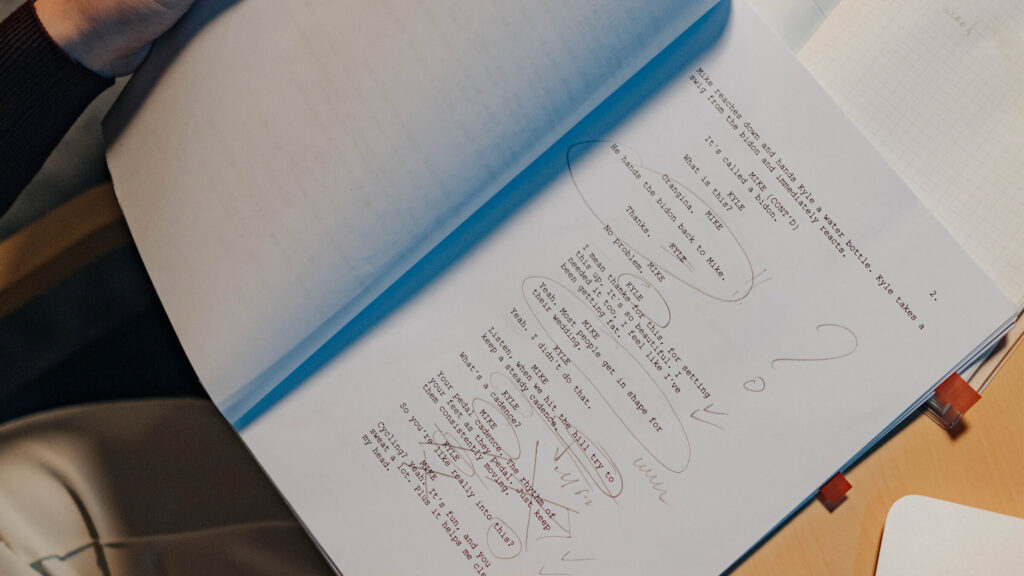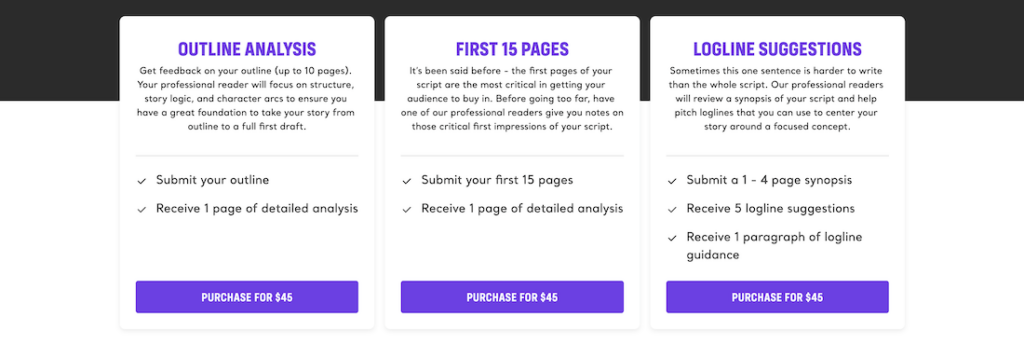Script coverage plays an essential role in developing a screenwriter’s skills and aids them in discovering their unique screenwriting voice.
Without guidance, novice screenwriters can often find themselves lingering between bland screenwriting and attempting to explore the wants, needs, guidelines, and expectations of the film industry they are trying to break into.
With that in mind, here we present the ultimate screenwriter’s guide to script coverage!
What Is Script Coverage?
Script coverage involves the evaluation and examination of a screenplay by a skilled script reader/story analyst or script consultant. This comprehensive assessment aims to gauge the screenplay’s viability for potential consideration and acquisition by studios, networks, streamers and production companies. The ultimate outcome of this process is the creation of a written report that meticulously outlines the strengths and weaknesses of the screenplay itself, as well as the screenwriter(s) behind it.

How Does Script Coverage Help Writers?
Screenwriters have the ability to harness the beneficial attributes of script coverage by utilizing paid script coverage services to improve their craft and help ready their writing and their screenplays for the movie and television industries. Script coverage — provided by experienced industry script readers, story analysts, and script consultants — can help you pinpoint your script’s strengths and weaknesses while providing suggestions to maximize its potential.
The script notes and feedback help to hone your skills and make your scripts shine brighter.
Does Script Coverage Help Studios?
Yes! When it comes to studios, networks, streamers, and production companies, script coverage plays a key role in giving development executives and producers valuable insights. It helps them figure out if the script and the screenwriter truly align with the company’s overall vision and brand. The script readers and story analysts, who are often the same person, base their assessment on what the company wants and needs. They determine whether the script fits the kind of projects they want to develop, produce and distribute.
Different Types of Script Coverage
There is a vast landscape of coverage options and definitions that you will come across in your screenwriting journey. Understanding which types of script coverage you, the screenwriter, can utilize to hone your skills is important.
Let’s explore five prominent types of script coverage available to screenwriters and examine their purpose and benefits. This analysis can help you find the most fitting type of screenplay coverage for you.
For a deeper dive, check out our article about all the different types of script coverage.

Genre-Specific Notes
Genre-specific notes are a type of script coverage that provides feedback and recommendations based on the conventions and expectations of a specific film genre. These notes consider the unique rules and norms followed by genres such as horror, action, thriller, adventure, comedy, mystery, drama, and their respective subgenres.
While still addressing story structure and character development, genre-specific notes also emphasize the tone, pacing and style relevant to the intended genre. They provide insights into how well the screenplay aligns with the genre’s overall landscape and its potential appeal to the target audience.
What makes genre-specific notes particularly intriguing is that the script consultant assigned to review your screenplay is typically a knowledgeable enthusiast of the genre you’re working with.
Check Out ScreenCraft’s Genre-Specific Notes!
Format-Specific Notes
Certain script consulting platforms offer specialized services that focus specifically on the formatting of your screenplay. Formatting is often a challenge for new writers, and although it may not determine the quality of your script, it does carry significance. Inadequate formatting can impede the reading experience of your screenplay and greatly impact studio coverage, as well as your chances in screenwriting contests, competitions and fellowships.
Format-specific notes comprehensively address all elements of your script, ensuring adherence to industry standards and expectations for proper formatting.
Preparation Notes
Consulting services provide preparation notes that assist in assessing the viability and effectiveness of the ideas, concepts, characters, and settings of a prospective screenplay prior to beginning the actual writing process.
Script consultants can offer evaluations of screenplay outlines, enabling you to identify the strengths and weaknesses of your characters and narratives even before a single page of the screenplay is written. They can also help screenwriters in crafting compelling loglines and synopses while also assisting in developing more engaging opening pages.

Development Notes
When you’re working on a screenplay while collaborating with a development executive or producer, they’ll give you development notes. These notes are typically given to screenwriters who have been hired for specific projects or are doing rewrites on scripts they’ve optioned or sold.
The purpose of these development notes is to help you, the screenwriter, make your script even better and get it closer to the vision they have for the project. This development process is key to getting a screenplay where it needs to be for potential acquisition, financing, and production.
Screenwriters can also pay for script coverage services that provide development notes similar to those found within Film/TV/Streaming industry companies.
Notes can cover a bunch of different elements, like:
- Story structure
- Character development
- Dialogue
- Pacing
- Tone
- Theme
Receiving development notes coverage helps screenwriters prepare for the development process that they will be facing if — and hopefully when — they reach a level in their career where they are under contract and collaborating with industry professionals.

Studio Coverage
Studio script coverage is a comprehensive in-house report commissioned by major studios, networks, streamers or production companies to thoroughly evaluate a screenplay. Its primary purpose is to assist high-level decision-makers in making informed investment decisions regarding potential projects.
This type of script coverage is written by an in-house script reader or a proficient external script consultant possessing a remarkable background in generating captivating and enlightening screenplay coverage. Agencies and management companies also utilize this type of coverage to dissect a screenplay’s relevance to their respective company’s client-focused vision, with the aim to determine how well the script aligns with the types of clients the agents and managers are seeking to represent.
However, studio script coverage is not something that screenwriters have access to. It is specifically meant for in-house development purposes.
Who Writes Script Coverage?
The best script coverage is written by individuals with industry experience working in film and television development branches of companies, as well as those with experience in writing and developing screenplays.
On the studio or network level, coverage can be written by any number of company employees and consultants, including:
- Interns
- Assistants
- Junior Development Executives
- Paid Script Readers/Story Analysts

These coverage writers are usually trained and given guidance by company development executives. They are instructed to keep a keen eye out for various company needs and wants. They are also given guidance to search for specific character strengths, enthralling story angles and many other concept, character and story elements that the company is looking for in screenplay submissions for potential development and acquisition.
When screenwriters pay for script coverage, the best script coverage service providers require their script consultants, readers and story analysts to have a certain amount of experience in movie and television industry development. It’s important to ensure that the service you pay for employs experienced coverage writers.
Explaining Script Coverage Ratings
Script readers and story analysts are tasked with prioritizing submissions through the assignment of one of three script coverage ratings:
- Pass
- Consider
- Recommend
Script coverage relies heavily on the pass, consider and recommend grading system, which plays a vital role in evaluating and processing the many screenplays in the spec script market. But what do these script coverage gradings mean?
Let’s go over each one briefly. (We do a deep-dive of script coverage ratings in another post, so go check that out if you want more information.)

Pass
In the realm of studios, networks, streamers and production companies, when it comes to script coverage, a “pass” typically signifies that the script will not progress further within the company’s hierarchy due to various reasons.
When it comes to script consulting services, a “pass” indicates that the screenplay is not yet ready for submission to industry professionals.
Consider
A “consider” indicates that the reader recognizes a script’s potential and considers it worthwhile for further consideration by higher-level executives within the production company. However, there might still be certain flaws or issues that need to be addressed before the script can be approved for acquisition, production, or further advancement.
For consulting service coverage, a “consider” grade can be uplifting for the screenwriter, as it indicates that their work showcases potential. When you receive a “consider” grade, you’re on the right track.
Recommend
Achieving a “recommend” grade is the ultimate recognition for a screenplay, but it is also the most challenging to attain.
Within the Hollywood system, bestowing a script with a “recommend” rating implies that the reader believes the script is fully prepared for production, worthy of substantial investments, and possesses the potential for great success.
For a script consulting service, a “recommend” signifies that the reader has confidence in the script’s readiness for submission to Hollywood companies and recognizes it as a work of high quality and marketability.
What Does Script Coverage Look Like?
Script coverage utilizes a particular structured form for presentation purposes. The formats and grading scales for coverage differ among companies, but over the years, most studio script coverage formats have maintained a relatively consistent pattern.
The average script coverage form looks like this:

When evaluating scripts, readers assess various elements, including the concept, story, characters, dialogue, pacing and structure. They also consider the script’s marketability, its potential for casting, and its overall suitability for consideration by the specific company employing the reader.
Script readers will fill out the blank informational elements of the form, including the title, format, and all credited screenwriters, as well as provide a summary of the story, logline, and overall comments.
But things get exciting once we get to the grading grid!
The Script Coverage Grading Grid

To assess the screenplay’s various elements according to the company’s needs and wants, a grid is employed to gauge the reader’s overall reaction. Most studio script coverage forms evaluate the concept, story, characters, dialogue, structure, pacing, catharsis, and originality.
These elements are graded by marking the boxes as Excellent, Good, Fair, or Poor with an X. At the bottom of the grid, the script and writer receive an overall grade — Recommend, Consider, or Pass — each described in detail above. The average placement of X in each category determines the final grade assigned to the script.
Here is what a completed script coverage grading grid would look like:

The overall assessment of this sample grid results in a “consider” grade, with the marks averaging out to this level. If a majority of the marks had been “excellent,” the script would have received a “recommend” grade.
If most of the marks had been “fair” or “poor,” it would have been an easy “pass,” implying a clear rejection.
CLICK HERE to download an editable script coverage document that you can use to write your own script coverage.
What’s the Difference Between Feedback, Notes, and Coverage?
Okay, you now know the ins and out of script coverage. Let’s delve into a more comprehensive understanding of the difference between feedback, notes, and coverage.
Feedback
Acquiring feedback on your screenwriting is a valuable tool that can significantly contribute to improving the quality of your work. Writing groups, peers, mentors, and commissioned script consulting coverage services contain general feedback to consider — but not changes that you need to actually make.
You should always keep in mind that feedback — even from a paid script consultant — is just someone’s opinion. It’s up to you to decide how to use it. However, if you receive similar feedback repeatedly, it might be worth considering making changes or investigating why those issues keep coming up.

Notes
Script notes are the analysis offered in script coverage written for studios, networks, streamers, production companies, agencies, and management companies.
The purpose of these notes is to give objective feedback and achieve specific goals set by the studio or network. This could involve adding or removing scenes, sequences, storylines, or character developments.
Typically, when studios or companies give notes, there isn’t much room for negotiation. Usually, if you receive these notes, it means you either have a contract for a writing assignment or your original spec script is going through its first contracted rewrite.
Coverage
When you receive script notes within paid coverage services, it’s key to remember that the notes within the script coverage are being offered through the lens of movie studios, television networks, and streamers. Thus, they are more objective than general feedback but still aren’t set in stone as far as what you need or are required to apply in further drafts.
The people writing the coverage are generally versed in the needs, wants, and current trends of the industry. Because of this, screenwriters should strongly consider the points being made within the coverage notes.

How to Use Script Coverage
Script coverage should always be used as a tool rather than a crutch. You can’t rely on it to write your screenplays for you. You can only use it as a tool to get some insight into possible changes and improvements that can better your chances of breaking through.
The benefit of script coverage is that it is just that — a tool. You’re not writing at the behest of a development executive or producer that may have particular demands. Instead, you’re being offered an educated and experienced opinion. And the points being brought up within the coverage you’ve paid for should be considered. But that’s where it stops. You can either apply what they have suggested or find a balance between what you’ve learned from the coverage and what your overall vision for your script is before you start submitting it to contests, competitions, fellowships, and, especially, to studios, networks, streamers, agencies and management companies.
You’re not using script coverage to get glowing reviews, receive inspiration for story and character ideas, or for proofreading. You should be using coverage for guidance, advice, and objective feedback.
Read More: What You Should and Shouldn’t Expect from Script Coverage
Best Script Coverage Services
If you’re looking for a free option for general screenplay feedback, CoverflyX offers a free peer script exchange. This type of coverage goes back to the feedback breakdown mentioned above, offering you a subjective reaction to your script. This free service also offers you the benefit of reviewing another screenwriter’s work, which can be an equally valuable experience.
As we mentioned before, the best script coverage services hire individuals with industry experience in studio script coverage and development.
Based on that guidance, here are some of the best script coverage services that we recommend.

ScreenCraft Screenplay Coverage
Regarded as one of the best in the industry, ScreenCraft’s script coverage services offer you script readers that are chosen specifically for the genre that your screenplay falls under. Thus, you’re not going to get someone that prefers period dramas but is tasked with reading your contemporary horror script. You’re going to get someone that is well-versed in whatever genre you are writing in.
WeScreenplay
WeScreenplay offers unique packages that range from $69 to $199, depending on the type of script and the amount of coverage you want. And even better, the coverage comes back to you at a faster rate in just 72 hours!
Launch Pad
More advanced emerging screenwriters can take advantage of Tracking Board’s Launch Pad coverage offered in a more studio-level aesthetic.
Coverfly Industry Direct Notes
Part script coverage from industry pros, part screenplay/screenwriter promotional platform, Coverfly gives writers the chance to buy notes directly from Hollywood TV and film executives. They tend to be pretty spendy, but they often come with follow-up phone calls with your reader.
Nicholl Fellowship Reader Comments
The Nicholl Fellowship is the Academy of Motion Picture Arts and Sciences fellowship competition, which is the most prestigious screenwriting competition in the industry. Per submission, screenwriters can pay extra for reader comments. And the readers that help judge the Fellowship are esteemed industry professionals.
Read More: Top 5 Best Screenplay Coverage Services
—
Script coverage is an essential industry tool for screenwriters, as well as the Film/TV/Streaming industries. On the screenwriter’s end, it can contain invaluable feedback to help learn and hone those professional skills for potential writing assignments and script sales.
Ken Miyamoto has worked in the film industry for nearly two decades, most notably as a studio liaison for Sony Studios and then as a script reader and story analyst for Sony Pictures.
He has many studio meetings under his belt as a produced screenwriter, meeting with the likes of Sony, Dreamworks, Universal, Disney, and Warner Brothers, as well as many production and management companies. He has had a previous development deal with Lionsgate, as well as multiple writing assignments, including the produced miniseries BLACKOUT, starring Anne Heche, Sean Patrick Flanery, Billy Zane, James Brolin, Haylie Duff, Brian Bloom, Eric La Salle, and Bruce Boxleitner, the feature thriller HUNTER’S CREED, and many produced Lifetime thrillers. Follow Ken on Twitter @KenMovies and Instagram @KenMovies76.
CHECK OUT OUR PREPARATION NOTES SO YOU START YOUR STORY OFF ON THE RIGHT TRACK!
The post A Screenwriter’s Guide to Script Coverage appeared first on ScreenCraft.
Go to Source
Author: Ken Miyamoto

